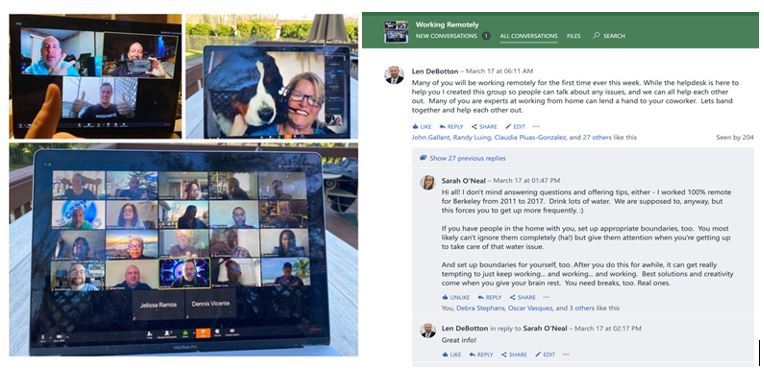Berkeley College Information Systems Team at the Forefront of Utilizing Technology to Engage Higher Education Workforce

Monday, April 13, 2020
BERKELEY COLLEGE INFORMATION SYSTEMS TEAM AT THE FOREFRONT OF UTILIZING TECHNOLOGY TO ENGAGE HIGHER EDUCATION WORKFORCE
Interview with Senior VP, Information Systems and Chief Information Officer Reflects Preparedness to Serve and Lessons Learned as College Transitioned Multiple Campuses to Online Environment during
COVID-19 Health Crisis

@All_Things_Edge @USDLA @Campus_Tech @Educause #NewsBerkeley
Three weeks before the tristate area entered a state of emergency, the Berkeley College Information Systems (IS) team already had informed administration, staff and faculty about proactive measures to address the pending disruption to onsite course instruction and operations in the wake of the COVID-19 health crisis. Little did they realize how valuable the familiar motto and best practice, “Be Prepared,” would turn out to be.
“We reached out several weeks before the pandemic by email, reminding staff of the tools that are in place to work from home, and asked them to verify they were ready to work from home,” said Leonard De Botton, Berkeley College Senior Vice President, Information Systems and Chief Information Officer. “That really helped us because we had dealt with some of the issues beforehand.”
Preparedness and Adaptability Count
It turned out that IS was well ahead of the curve in working with the provost, deans, department chairs and faculty to be successful in transitioning all on-site courses online, since more than half of the students already were enrolled in at least one online course; 24 percent are earning their degrees fully online. Berkeley College has been a leading institution in distance learning for more than 20 years.
“Our back-end infrastructure and support for online learning and working from home was already in place,” De Botton said. “Simple data collection included a quick survey of students to see if everyone had computers to use at home. Typically, the computers are on loan to students only when on campus, but as with any type of crisis, we needed to change and adapt the rules. Berkeley allowed a number of those laptops for use at home by students who expressed a need.”
On the remote work side, De Botton said staff members are now competing for computer time with their school-age children. As parents, they may not have full access to their home computers. “The surprise was that they (the staff) were now in competition with their kids and spouse who also are working from home. Luckily, staff members reached out to us and we were able to supply them with what they needed.”
On-the-Job Learning and Staff Engagement Make a Difference
Thus far, De Botton and the IS team have gained valuable insights through this mandatory virtual online experience. “I gained an understanding of what it means to lead people quickly,” he said. “I realized we could lessen the length and change the frequency of meetings held weekly or monthly by having quick daily meetings instead, to keep a pulse on how things were going. You do not have to be in long, drawn out meetings, where everyone is in a room together. People don’t have to travel from one campus to another.”
Zoom access and training at Berkeley College began a year and a half ago, but over the last three weeks, the whole institution was using it. “There’s no going back,” De Botton said. “Zoom allows you to connect directly with people quickly.”
De Botton recently introduced a Yammer Jam “Working-from-Home” group. “During a certain time of day, members of my team and I would be in the Jam and answer questions. We were interacting with people who we never interacted with before. It also allowed other participants – not necessarily those in IS – to offer their help and support. In addition, the questions weren’t all IS-related. They could be about how to work with your children at home or about the best place to find toilet paper. The whole group was engaged. The nice thing about the Yammer Working-from-Home group is that it took on a life of its own. People started doing their own Yammer groups in their departments, and with students as well, and that was positive.” Yammer is a social networking service, somewhat like Facebook, used for private communication within organizations.
In addition, De Botton said he uses Zoom for more than just meetings. “I realized early on that it was important to use technology to bring people together. Virtual staff get-togethers give people a sense of togetherness regardless of where they are.”
While the IS team did anticipate more inquiries to its Help Desk, and scheduled more staff for that function, the majority of the questions that came in after transitioning fully online were not from students. They were from staff working at home and having issues with their home internet or a computer problem. “We’ve been monitoring volume and we haven’t been overwhelmed by the amount of calls so we have taken those additional staff members and returned them to their regular roles,” said De Botton.
Advice from the Heart
Going forward, De Botton offered the following advice as employees continue working from home:
- Remember to laugh through all of this.
- Don’t become a crazed workaholic. It is not easy to take a break when you are sitting at your desk.
- Don’t forget about the whole work-life-home balance just because now you are working at home.
- Remember to get up from your seat and walk around.
- You cannot meet people at the coffee machine or the water cooler anymore, so embrace opportunities to talk with people in other ways

About Leonard De Botton
Leonard De Botton, Senior Vice President and Chief Information Officer, has more than 25 years of leadership experience in the field of information technology at Berkeley College. He oversees the Information Systems Department, and Online Faculty Support Team, and the Administrative Technology, Teaching and Learning, Distance Learning, and Information Security committees. De Botton has served as a trustee of NJEDge.Net eight years. He is a board member of the Leadership Board for Chief Information Officers and has presented at numerous technology conferences, including those sponsored by the National Blackboard Conference and NJEDge.Net, and has assisted on the analysis presented in the Information Technology in Higher Education Survey of Chief Information Officers for many years. De Botton holds a M.S. in Information Systems from the University of Phoenix; a B.S. in Information Systems jointly from Rutgers, The State University of New Jersey and New Jersey Institute of Technology; and an A.A.S. in Information Systems from the County College of Morris.
About Berkeley College
Berkeley College, founded in 1931, is a career-focused institution accredited by the Middle States Commission on Higher Education that offers students Master’s, Bachelor’s, and Associate’s Degree and Certificate programs in more than 20 career fields. The College has campuses in Midtown Manhattan and White Plains, NY, as well as in Newark, Paramus, Woodbridge and Woodland Park, NJ, with more than 5,700 students enrolled. In addition, Berkeley College Online® serves a global population. U.S. News & World Report has named Berkeley College among the Best Colleges for Online Bachelor’s Programs and among the Best Online Bachelor’s Programs for Veterans, for seven consecutive years. The website address is www.BerkeleyCollege.edu.
The mission of Berkeley College is to empower students to achieve lifelong success in dynamic careers.
- end -
To view the images in high-resolution go to:
Top: https://berkeleycollege.edu/newsroom/images/IS_PR_Combo.jpg

